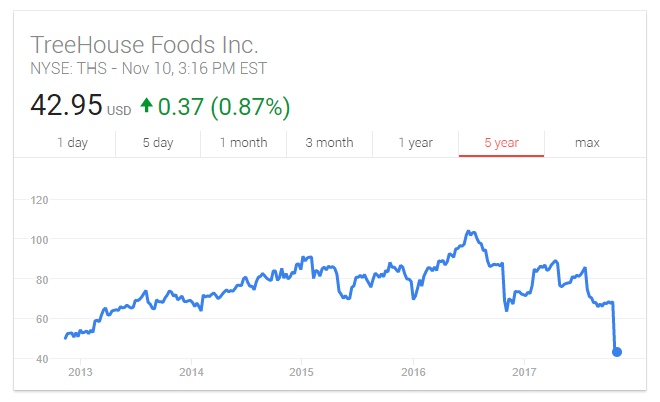For decades the consumer staples sector was viewed by investors as a stable and predictable cash flow generator with above-average dividend yields and below-average volatility. In particular, food companies like Kraft and Pepsi fit the bill, with brands that stood the test of time.
Lately, however, investor sentiment has shifted. While brand names continue to have loyal followers, younger consumers often prefer private label foods that come with lower prices and quality that is close enough to the branded alternative that they are more than adequate. I understand this view completely, as my family buys many store brand products from Safeway, Target, and Whole Foods.
So while the gap between store brands and global brands narrows, should food and beverage as a category be seen as no longer stable, predictable, and defensive? By the looks of the stock charts, as the tech sector powers the current bull market ever-higher, you would think that food is no longer a consumer staple. I say that because both private label and national brands are getting pummeled on Wall Street. I am baffled as to how that can be happening at the same time.
Should Kraft trade at 16x EBITDA these days? Probably not, given that they are set to cede market share over time. But there are other consumer brands that have fallen to levels that are truly cheap (as opposed to trading at a premium that may no longer be warranted).
One I like is J.M. Smucker (SJM), which has fallen from $140 to $100 over the last nine months or so. SJM owns brands such as Jif, Smucker's, Crisco, Wesson, Folgers, Pillsbury, Hungry Jack, Milk Bone, and Kibbles 'n Bits. While these brands will likely not grow market share in the future, they should continue to be cash cows for the company over the long-term. In the meantime, SJM has the scale and experience to launch brand extensions and new products that can resonate more with younger shoppers (examples being all natural, organic jam from Smucker's or Natural Balance pet food). Today SJM shares trade for 15x normalized free cash flow (which I estimate to be $7 per share) and carry a dividend yield of over 3%. They look underpriced to me.
Perhaps more interesting is the fact that the world's leading supplier of private label foods, Treehouse Foods (THS), has had one of the ugliest sell-offs lately that you will ever see from a multi-billion dollar a year category leader:
Treehouse counts each of the 50 largest food retailers as customers, with the top 10 accounting for more than half of the company's $6 billion in annual revenue. If you want to place an investment bet on private label foods increasing market share over the coming 5-10 years, THS is your stock. Needless to say, it has been quite a headache in recent months (I have been building positions in the name throughout 2017).
Treehouse's valuation makes J.M. Smucker look like nothing worth mentioning. Even after missing their own internal financial projections for most of 2017, I estimate that THS should book between $250 and $300 million of free cash flow this year. The current market value of the company is only $2.45 billion, which makes for a sub-10x free cash flow multiple. And that is for the largest private label food company out there. For comparison, over the last 10 years, THS shares have fetched an average of 16x free cash flow, which seems quite reasonable.
So we are in a weird moment in time where restaurant stocks are getting crushed (due to rising labor costs, a proliferation of home delivery services, and excess unit expansion in recent years), brand name food stocks are losing their once-premium valuations (due to private label encroachment), and the big private label supplier has seen its share price more than cut in half (due to management missteps after a large acquisition). Simply put, how can this all be rational at the same time?
Well, I am making a bet that things normalize over the longer term. I think it is fair to say that large, global food and beverage brands should no longer trade at premiums to the S&P 500, but I think any material discount is unwarranted as well. Dining out will continue to book huge sales figures overall, but profit margins are likely to permanently compress, so valuation models need to factor in that likely reality. And as private label foods stand to gain market share over time, I cannot help but think Treehouse will fix their operational issues, grow free cash flow per share over the long-term, and once again fetch a more normal valuation (15-20x seems appropriate to me).
None of these outcomes will garner the attention from investors that an Amazon, Tesla, or a Netflix will, but if you care about valuation when investing your capital, we are talking about large multi-billion businesses that are here to stay and will generate fairly consistent profits for decades to come.
Full Disclosure: Long SJM and THS at the time of writing, but positions may change at any time

